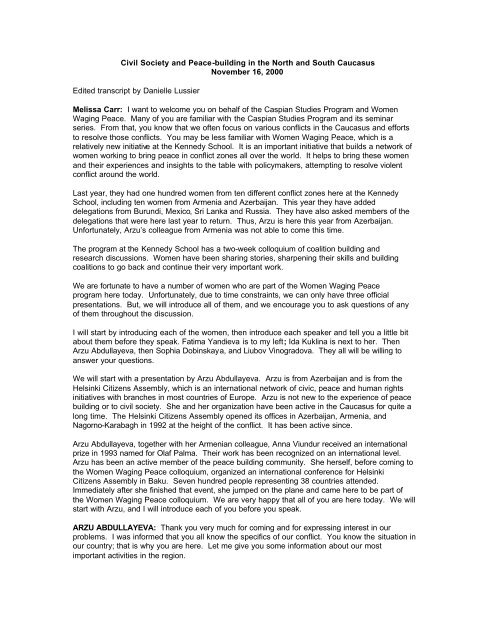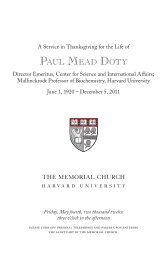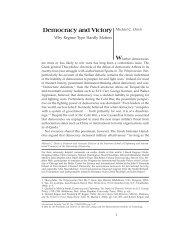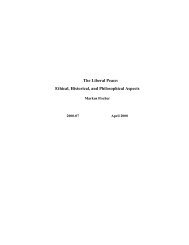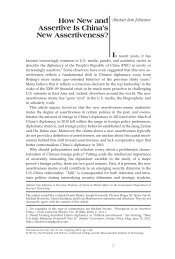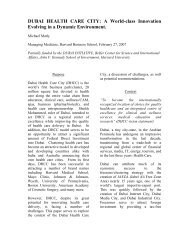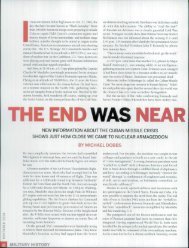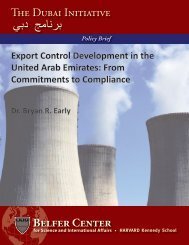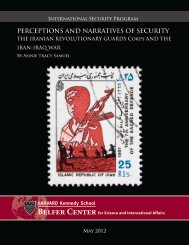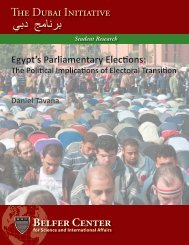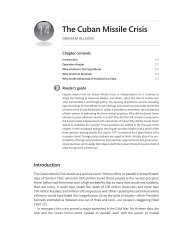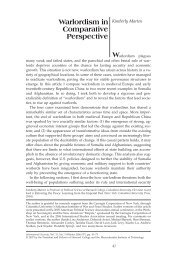Civil Society and Peace-building in the North and South Caucasus ...
Civil Society and Peace-building in the North and South Caucasus ...
Civil Society and Peace-building in the North and South Caucasus ...
You also want an ePaper? Increase the reach of your titles
YUMPU automatically turns print PDFs into web optimized ePapers that Google loves.
<strong>Civil</strong> <strong>Society</strong> <strong>and</strong> <strong>Peace</strong>-<strong>build<strong>in</strong>g</strong> <strong>in</strong> <strong>the</strong> <strong>North</strong> <strong>and</strong> <strong>South</strong> <strong>Caucasus</strong><br />
November 16, 2000<br />
Edited transcript by Danielle Lussier<br />
Melissa Carr: I want to welcome you on behalf of <strong>the</strong> Caspian Studies Program <strong>and</strong> Women<br />
Wag<strong>in</strong>g <strong>Peace</strong>. Many of you are familiar with <strong>the</strong> Caspian Studies Program <strong>and</strong> its sem<strong>in</strong>ar<br />
series. From that, you know that we often focus on various conflicts <strong>in</strong> <strong>the</strong> <strong>Caucasus</strong> <strong>and</strong> efforts<br />
to resolve those conflicts. You may be less familiar with Women Wag<strong>in</strong>g <strong>Peace</strong>, which is a<br />
relatively new <strong>in</strong>itiative at <strong>the</strong> Kennedy School. It is an important <strong>in</strong>itiative that builds a network of<br />
women work<strong>in</strong>g to br<strong>in</strong>g peace <strong>in</strong> conflict zones all over <strong>the</strong> world. It helps to br<strong>in</strong>g <strong>the</strong>se women<br />
<strong>and</strong> <strong>the</strong>ir experiences <strong>and</strong> <strong>in</strong>sights to <strong>the</strong> table with policymakers, attempt<strong>in</strong>g to resolve violent<br />
conflict around <strong>the</strong> world.<br />
Last year, <strong>the</strong>y had one hundred women from ten different conflict zones here at <strong>the</strong> Kennedy<br />
School, <strong>in</strong>clud<strong>in</strong>g ten women from Armenia <strong>and</strong> Azerbaijan. This year <strong>the</strong>y have added<br />
delegations from Burundi, Mexico, Sri Lanka <strong>and</strong> Russia. They have also asked members of <strong>the</strong><br />
delegations that were here last year to return. Thus, Arzu is here this year from Azerbaijan.<br />
Unfortunately, Arzu’s colleague from Armenia was not able to come this time.<br />
The program at <strong>the</strong> Kennedy School has a two-week colloquium of coalition <strong>build<strong>in</strong>g</strong> <strong>and</strong><br />
research discussions. Women have been shar<strong>in</strong>g stories, sharpen<strong>in</strong>g <strong>the</strong>ir skills <strong>and</strong> <strong>build<strong>in</strong>g</strong><br />
coalitions to go back <strong>and</strong> cont<strong>in</strong>ue <strong>the</strong>ir very important work.<br />
We are fortunate to have a number of women who are part of <strong>the</strong> Women Wag<strong>in</strong>g <strong>Peace</strong><br />
program here today. Unfortunately, due to time constra<strong>in</strong>ts, we can only have three official<br />
presentations. But, we will <strong>in</strong>troduce all of <strong>the</strong>m, <strong>and</strong> we encourage you to ask questions of any<br />
of <strong>the</strong>m throughout <strong>the</strong> discussion.<br />
I will start by <strong>in</strong>troduc<strong>in</strong>g each of <strong>the</strong> women, <strong>the</strong>n <strong>in</strong>troduce each speaker <strong>and</strong> tell you a little bit<br />
about <strong>the</strong>m before <strong>the</strong>y speak. Fatima Y<strong>and</strong>ieva is to my left; Ida Kukl<strong>in</strong>a is next to her. Then<br />
Arzu Abdullayeva, <strong>the</strong>n Sophia Dob<strong>in</strong>skaya, <strong>and</strong> Liubov V<strong>in</strong>ogradova. They all will be will<strong>in</strong>g to<br />
answer your questions.<br />
We will start with a presentation by Arzu Abdullayeva. Arzu is from Azerbaijan <strong>and</strong> is from <strong>the</strong><br />
Hels<strong>in</strong>ki Citizens Assembly, which is an <strong>in</strong>ternational network of civic, peace <strong>and</strong> human rights<br />
<strong>in</strong>itiatives with branches <strong>in</strong> most countries of Europe. Arzu is not new to <strong>the</strong> experience of peace<br />
<strong>build<strong>in</strong>g</strong> or to civil society. She <strong>and</strong> her organization have been active <strong>in</strong> <strong>the</strong> <strong>Caucasus</strong> for quite a<br />
long time. The Hels<strong>in</strong>ki Citizens Assembly opened its offices <strong>in</strong> Azerbaijan, Armenia, <strong>and</strong><br />
Nagorno-Karabagh <strong>in</strong> 1992 at <strong>the</strong> height of <strong>the</strong> conflict. It has been active s<strong>in</strong>ce.<br />
Arzu Abdullayeva, toge<strong>the</strong>r with her Armenian colleague, Anna Viundur received an <strong>in</strong>ternational<br />
prize <strong>in</strong> 1993 named for Olaf Palma. Their work has been recognized on an <strong>in</strong>ternational level.<br />
Arzu has been an active member of <strong>the</strong> peace <strong>build<strong>in</strong>g</strong> community. She herself, before com<strong>in</strong>g to<br />
<strong>the</strong> Women Wag<strong>in</strong>g <strong>Peace</strong> colloquium, organized an <strong>in</strong>ternational conference for Hels<strong>in</strong>ki<br />
Citizens Assembly <strong>in</strong> Baku. Seven hundred people represent<strong>in</strong>g 38 countries attended.<br />
Immediately after she f<strong>in</strong>ished that event, she jumped on <strong>the</strong> plane <strong>and</strong> came here to be part of<br />
<strong>the</strong> Women Wag<strong>in</strong>g <strong>Peace</strong> colloquium. We are very happy that all of you are here today. We will<br />
start with Arzu, <strong>and</strong> I will <strong>in</strong>troduce each of you before you speak.<br />
ARZU ABDULLAYEVA: Thank you very much for com<strong>in</strong>g <strong>and</strong> for express<strong>in</strong>g <strong>in</strong>terest <strong>in</strong> our<br />
problems. I was <strong>in</strong>formed that you all know <strong>the</strong> specifics of our conflict. You know <strong>the</strong> situation <strong>in</strong><br />
our country; that is why you are here. Let me give you some <strong>in</strong>formation about our most<br />
important activities <strong>in</strong> <strong>the</strong> region.
We try to work on <strong>the</strong> public level. This is important – <strong>and</strong> I th<strong>in</strong>k you will agree with me –<br />
because non-governmental organizations do not have <strong>the</strong> ability to declare peace. NGOs are<br />
never <strong>in</strong>volved <strong>in</strong> <strong>the</strong> process of sign<strong>in</strong>g peace agreements. But, we prepare <strong>the</strong> public op<strong>in</strong>ion<br />
for peace. It is never possible to have a political decision without work<strong>in</strong>g on <strong>the</strong> public op<strong>in</strong>ion.<br />
Unfortunately, it is not only we who understood this <strong>and</strong> worked on it.<br />
Why did <strong>the</strong> conflict start? The conflict started twelve years ago <strong>in</strong> 1988 <strong>in</strong> our countries –<br />
between neighbors Armenia <strong>and</strong> Azerbaijan - because of Nagorno-Karabagh, this small<br />
mounta<strong>in</strong>ous place on Azerbaijani territory where Armenian national m<strong>in</strong>orities lived. They had<br />
had a friendship before <strong>the</strong> beg<strong>in</strong>n<strong>in</strong>g of <strong>the</strong> conflict.<br />
The desire for national m<strong>in</strong>orities to jo<strong>in</strong> <strong>the</strong>ir mo<strong>the</strong>r nation is easy to underst<strong>and</strong>. It is easy to<br />
underst<strong>and</strong> why <strong>the</strong>y raised <strong>the</strong>se sorts of dem<strong>and</strong>s. But at <strong>the</strong> same time, we underst<strong>and</strong> that<br />
<strong>the</strong>re were forces us<strong>in</strong>g <strong>the</strong>se human, personal, <strong>and</strong> collective desires. What was <strong>the</strong> <strong>in</strong>terest of<br />
<strong>the</strong> people outside? We could name it <strong>the</strong> third party. Why was a third party <strong>in</strong>terested <strong>in</strong> help<strong>in</strong>g<br />
<strong>the</strong>se Armenian m<strong>in</strong>orities liv<strong>in</strong>g <strong>in</strong> Azerbaijan to jo<strong>in</strong> <strong>the</strong>ir territory to Armenia? Why did <strong>the</strong>y<br />
support it? Where could we f<strong>in</strong>d <strong>the</strong> answer so that everyth<strong>in</strong>g becomes clear? We could divide<br />
<strong>the</strong>se people based on whe<strong>the</strong>r <strong>the</strong>y are pursu<strong>in</strong>g good or bad will. Good will people, as most<br />
people are, would try to protect national m<strong>in</strong>orities’ rights. It is a good idea. It is a human issue.<br />
But, bad will people like to use <strong>the</strong>se problems to <strong>the</strong>ir own advantage.<br />
What is this advantage? It is a bad, dirty political game. At <strong>the</strong> time when conflict could have<br />
been solved, or we could have discussed it on a civilian level, this third party became <strong>in</strong>volved <strong>in</strong><br />
<strong>the</strong> process <strong>and</strong> pushed it to develop <strong>in</strong>to a conflict. There was a time when <strong>the</strong> third party gave<br />
armaments to <strong>the</strong> sides. Sure, if you have a gun, what will you do with it? You will shoot each<br />
o<strong>the</strong>r. The same war model was used aga<strong>in</strong>st our people.<br />
What are we do<strong>in</strong>g now? We try to expla<strong>in</strong> to people, “Th<strong>in</strong>k. Who ga<strong>in</strong>s <strong>the</strong> advantage <strong>in</strong> this<br />
conflict? Who gets <strong>the</strong> advantage when we shoot each o<strong>the</strong>r?” If you could get an answer, it<br />
would be very easy to underst<strong>and</strong> each o<strong>the</strong>r. Mo<strong>the</strong>rs lose <strong>the</strong>ir sons <strong>in</strong> <strong>the</strong> war. A lot of<br />
miss<strong>in</strong>g people, <strong>in</strong>valids, refugees, IDPs [<strong>in</strong>ternally displaced persons] - <strong>the</strong>y are simple people<br />
who are <strong>the</strong> victims. But at <strong>the</strong> same time, it is an aggressive k<strong>in</strong>d of society. That is why us<strong>in</strong>g<br />
<strong>the</strong>se suffer<strong>in</strong>g people to escalate a new wave of <strong>the</strong> conflict is very easy.<br />
We try to expla<strong>in</strong> that <strong>the</strong>re is a war model. Let’s start a peace model. <strong>Peace</strong> models beg<strong>in</strong><br />
when <strong>the</strong>re is an <strong>in</strong>terest from <strong>the</strong> people.<br />
What can we do to achieve <strong>the</strong> peace? First of all, <strong>the</strong> mass media was used to create hysteria<br />
<strong>and</strong> <strong>the</strong> image of an enemy. We try to abolish this enemy image, <strong>and</strong> we have achieved this <strong>in</strong><br />
our conflict. Sure, <strong>the</strong>re are a few organizations <strong>and</strong> people on both sides of <strong>the</strong> conflict who do<br />
not favor <strong>the</strong> achievement of peace. Even now, <strong>the</strong>y make statements that <strong>the</strong> conflict can only<br />
be solved through war. I can say frankly, however, that most of <strong>the</strong> population from both Armenia<br />
<strong>and</strong> Azerbaijan is ready for peaceful measures to solve <strong>the</strong> conflict.<br />
We currently have a cease-fire that was achieved <strong>in</strong> 1994. The situation, as you can imag<strong>in</strong>e, is<br />
not war but not peace. We should do our best to achieve a positive peace. A lot of people are<br />
th<strong>in</strong>k<strong>in</strong>g now that, “I jo<strong>in</strong> you <strong>in</strong> your peace-mak<strong>in</strong>g activities. I am on your side when you say that<br />
peace measures should come first.” But, <strong>the</strong> political decision is not ours. It will be made<br />
outside. A politician should do it. We could agree partly because we feel that if only politicians<br />
have <strong>the</strong> opportunity to make decisions, <strong>the</strong> result could be far from just. People could cont<strong>in</strong>ue<br />
<strong>the</strong>ir work to sit down <strong>and</strong> th<strong>in</strong>k it out toge<strong>the</strong>r, as we did to elim<strong>in</strong>ate <strong>the</strong> enemy image <strong>in</strong> society.<br />
We have a lot of meet<strong>in</strong>gs <strong>and</strong> a lot of activities. We use <strong>the</strong> media for expla<strong>in</strong><strong>in</strong>g <strong>the</strong> war model<br />
<strong>and</strong> <strong>the</strong> peace model. We have a lot of mutual actions. For example, we have ga<strong>in</strong>ed <strong>the</strong> trust of<br />
society because we search for miss<strong>in</strong>g persons on both sides. Each side helps <strong>the</strong> o<strong>the</strong>r. For<br />
example, <strong>in</strong> Azerbaijan, we search for miss<strong>in</strong>g people from Armenia, <strong>and</strong> we promote <strong>the</strong> release<br />
of hostages <strong>and</strong> prisoners of war. At <strong>the</strong> same time, my colleagues from Armenia <strong>and</strong> Nagorno-
Karabagh promote <strong>the</strong> release of Azerbaijani prisoners of war <strong>and</strong> hostages. This is how we earn<br />
<strong>the</strong> trust of society, <strong>and</strong> <strong>the</strong>y believe <strong>in</strong> our activities.<br />
What are we do<strong>in</strong>g <strong>in</strong> our society now? We cont<strong>in</strong>ue our work to save our very fragile peace,<br />
because unfortunately we build our peace step-by-step, stone by stone. But bad-will politicians<br />
could destroy it. What can we do to prevent it? We just cont<strong>in</strong>ue our work <strong>and</strong> our explanations.<br />
We educate people <strong>and</strong> repeat every time, “Who has <strong>the</strong> advantage?” And, “Don’t give <strong>the</strong>m <strong>the</strong><br />
opportunity to use you aga<strong>in</strong>st each o<strong>the</strong>r. Don’t be <strong>the</strong> tool of someone who has o<strong>the</strong>r <strong>in</strong>terests<br />
<strong>in</strong> <strong>the</strong> war.”<br />
I am out of time, but I would be pleased to answer questions.<br />
CARR: Thank you, Arzu. Our next speaker will be Ida Kukl<strong>in</strong>a, who is currently <strong>the</strong> Secretary of<br />
<strong>the</strong> Committee of Soldiers’ Mo<strong>the</strong>rs of Russia. She is on <strong>the</strong> Analytical <strong>and</strong> Information<br />
Commission <strong>and</strong> also a member of <strong>the</strong> Coord<strong>in</strong>ation Council. Many of you are familiar with <strong>the</strong><br />
work of Ida’s organization. They have been very active <strong>in</strong> push<strong>in</strong>g for military reform <strong>in</strong> Russia:<br />
<strong>in</strong> <strong>the</strong> first war <strong>in</strong> Chechnya, for push<strong>in</strong>g for <strong>the</strong> end of <strong>the</strong> war, <strong>and</strong> also <strong>in</strong> <strong>the</strong> current war <strong>in</strong><br />
Chechnya, <strong>the</strong>y have been work<strong>in</strong>g to try to end <strong>the</strong> war, <strong>and</strong> to try to promote <strong>the</strong> human rights<br />
of people <strong>in</strong> Chechnya, <strong>and</strong> also of <strong>the</strong> soldiers <strong>and</strong> <strong>the</strong> soldiers’ families <strong>in</strong> Russia.<br />
One of <strong>the</strong> organization’s most famous efforts, <strong>and</strong> one of Ida’s own personal most memorable<br />
experiences <strong>in</strong> peace work was <strong>in</strong> 1994 when <strong>the</strong> Committee of Soldiers’ Mo<strong>the</strong>rs of Russia<br />
comprised a delegation of a number of NGOs work<strong>in</strong>g for peace <strong>and</strong> marched on Grozny, try<strong>in</strong>g<br />
to br<strong>in</strong>g about peace <strong>and</strong> to voice <strong>the</strong> public op<strong>in</strong>ion opposed to <strong>the</strong> war <strong>in</strong> Chechnya.<br />
Ida’s organization, <strong>the</strong> Committee of Soldiers’ Mo<strong>the</strong>rs of Russia, has been active for many years<br />
<strong>and</strong> received an Alternative Nobel <strong>Peace</strong> Prize <strong>in</strong> 1996, of which <strong>the</strong> organization is quite proud.<br />
Ida is go<strong>in</strong>g to tell us a little bit about her work <strong>and</strong> her organization’s efforts to <strong>in</strong>fluence policy,<br />
<strong>and</strong> <strong>the</strong> environment that <strong>the</strong>y work <strong>in</strong> <strong>in</strong> Russia.<br />
IDA KUKLINA: Thank you for com<strong>in</strong>g. It is a great honor for me to speak here. One small note<br />
before I start, <strong>the</strong>re was a very well known peace march. But our evaluation of this action does<br />
not co<strong>in</strong>cide with <strong>the</strong> word “well known” because we th<strong>in</strong>k <strong>the</strong> peace march created a very tricky<br />
situation. We are suspicious that after this peace march, <strong>the</strong> Chechen village, Somashki, was<br />
destroyed. So let us not speak about this peace march.<br />
I would like to concentrate on <strong>the</strong> differences that exist between <strong>the</strong> first Chechen war <strong>and</strong> <strong>the</strong><br />
second war; I mean <strong>the</strong> periods 1994-96, <strong>and</strong> s<strong>in</strong>ce August 1999. I will try to show how <strong>the</strong><br />
situation changed for <strong>the</strong> Soldiers’ Mo<strong>the</strong>rs, because of course we are <strong>the</strong> most massive<br />
grassroots organization <strong>in</strong> Russia. We are absolutely <strong>in</strong>dependent of <strong>the</strong> government <strong>and</strong> any<br />
political structures. Therefore, it is very <strong>in</strong>terest<strong>in</strong>g how an NGO can <strong>in</strong>fluence government policy,<br />
<strong>and</strong> <strong>in</strong> turn, what <strong>the</strong> government is do<strong>in</strong>g to fight this <strong>in</strong>fluence.<br />
In <strong>the</strong> first Chechen war, <strong>the</strong> conflict zone was absolutely open for us. The Soldiers’ Mo<strong>the</strong>rs<br />
came to Chechnya from both sides. They came from <strong>the</strong> Federal side to <strong>the</strong> military units to take<br />
<strong>the</strong>ir sons from <strong>the</strong> military units. There was a mass movement. They also came from <strong>the</strong><br />
Chechen side look<strong>in</strong>g for <strong>the</strong>ir sons who were prisoners of war, killed or miss<strong>in</strong>g. At this time <strong>in</strong><br />
Chechnya, <strong>the</strong>re were several hundred Soldiers’ Mo<strong>the</strong>rs who were look<strong>in</strong>g for <strong>the</strong>ir sons. The<br />
conflict was also open for <strong>the</strong> media.<br />
Now <strong>the</strong> situation has changed quite a lot. We had used <strong>the</strong> openness of <strong>the</strong> conflict zone to<br />
pursue our goals <strong>and</strong> <strong>in</strong>terests. Now, with Put<strong>in</strong> com<strong>in</strong>g to <strong>the</strong> Kreml<strong>in</strong>, <strong>the</strong> Federal authorities<br />
have prepared for us. They closed <strong>the</strong> conflict zone completely. We now cannot move to <strong>the</strong><br />
military units. One of our regional representatives who tried to enter was told, “We will shoot any<br />
mov<strong>in</strong>g object if it is mov<strong>in</strong>g without our permission.” As a result, we cannot go freely to <strong>the</strong><br />
military units from <strong>the</strong> federal side.
The same is true for <strong>the</strong> Chechen side. The situation <strong>in</strong>side <strong>the</strong> Chechen community also<br />
changed a lot <strong>in</strong> comparison to <strong>the</strong> first war. It is too dangerous to go <strong>the</strong>re. And, to where? For<br />
what? Those are <strong>the</strong> questions.<br />
Never<strong>the</strong>less, we preserved some ties <strong>and</strong> connections with Chechen women <strong>and</strong> organizations.<br />
For example, we are still work<strong>in</strong>g very closely with <strong>the</strong> Chechen Committee for Human Rights.<br />
The chairman was at <strong>the</strong> Baku Conference. The last time we met was <strong>in</strong> Baku. We made a jo<strong>in</strong>t<br />
statement. We paid <strong>the</strong> expenses of a Chechen woman, Zen Abgashaiva, who was work<strong>in</strong>g with<br />
<strong>the</strong> peacemak<strong>in</strong>g center <strong>in</strong> Moscow, to go to Nazran to deal with humanitarian questions. So,<br />
<strong>the</strong>re is a connection, but it is a different k<strong>in</strong>d of connection than it was dur<strong>in</strong>g <strong>the</strong> first war. It<br />
could have been said that we had connections with all Chechen people - that we could move<br />
freely among <strong>the</strong>m. Now it is not possible. That is one difference.<br />
Ano<strong>the</strong>r difference is that we mobilized public op<strong>in</strong>ion aga<strong>in</strong>st <strong>the</strong> first war. Very seriously. The<br />
government took this factor <strong>in</strong>to consideration. As a result, <strong>the</strong>y prepared public op<strong>in</strong>ion for <strong>the</strong><br />
second war. It was done quite correctly, from <strong>the</strong> po<strong>in</strong>t of view of <strong>the</strong> federal authorities. First of<br />
all, <strong>the</strong>y presented it, not as a Russian or Federal aggression, but ra<strong>the</strong>r as Chechen aggression<br />
aga<strong>in</strong>st Dagestan. Then, <strong>the</strong>re was an explosion <strong>in</strong> Moscow. We don’t know yet…<strong>the</strong>re have<br />
been no trials. But never<strong>the</strong>less, public op<strong>in</strong>ion began to believe that <strong>the</strong>re was a Chechen crisis.<br />
Though legally, no one can say that <strong>the</strong> Chechens caused <strong>the</strong> explosions <strong>in</strong> various cities <strong>in</strong><br />
Russia.<br />
Also, Put<strong>in</strong> himself immediately declared that if participants <strong>in</strong> <strong>the</strong> Yugoslavian peacekeep<strong>in</strong>g<br />
operations were receiv<strong>in</strong>g $1000 per month, <strong>the</strong>n Russia should pay its soldiers <strong>the</strong> same sum<br />
because <strong>the</strong>y were engag<strong>in</strong>g <strong>in</strong> patriotic work defend<strong>in</strong>g <strong>the</strong>ir homel<strong>and</strong> aga<strong>in</strong>st terrorists.<br />
In <strong>the</strong> very beg<strong>in</strong>n<strong>in</strong>g of <strong>the</strong> second war, only a few mo<strong>the</strong>rs came to us for help. So we had to<br />
change our tactic to mobilize public op<strong>in</strong>ion. We tried to reveal every lie that <strong>the</strong> military spread<br />
about <strong>the</strong> conflict. The first <strong>in</strong>volved <strong>the</strong> human losses. There was a very broad public campaign<br />
<strong>in</strong> which we proved that <strong>the</strong>y were ly<strong>in</strong>g about human losses. Of course, <strong>in</strong> <strong>the</strong> first period of <strong>the</strong><br />
war, only a few Russian journalists openly declared <strong>the</strong>ir anti-war position. Most of <strong>the</strong> media<br />
was silent. So we used <strong>the</strong> foreign media so that <strong>the</strong> Russian media could no longer ignore <strong>the</strong><br />
issue <strong>and</strong> <strong>the</strong> th<strong>in</strong>gs we were tell<strong>in</strong>g <strong>the</strong>m about <strong>the</strong> conflict zone.<br />
There were also a lot of mass protests dur<strong>in</strong>g <strong>the</strong> first war. There were meet<strong>in</strong>gs <strong>in</strong> Moscow <strong>and</strong><br />
Chechnya. Now <strong>the</strong>y have proven to be less effective. The protests <strong>in</strong> Moscow <strong>and</strong> <strong>the</strong> regions<br />
draw too few people. So we th<strong>in</strong>k we will use this k<strong>in</strong>d of pressure on <strong>the</strong> government when we<br />
can be certa<strong>in</strong> of its effectiveness. At <strong>the</strong> moment, it is not effective.<br />
We used all of our <strong>in</strong>fluence <strong>in</strong> <strong>the</strong> previous Duma. The composition of <strong>the</strong> previous Duma was<br />
much better for us than it is now. In 1996 it was not so difficult for us to push through <strong>the</strong> Duma<br />
our amnesty project for all <strong>the</strong> participants of <strong>the</strong> conflict on both <strong>the</strong> Chechens <strong>and</strong> <strong>the</strong> federal<br />
side. We were <strong>the</strong> very first NGO that protected human rights on both sides of <strong>the</strong> front l<strong>in</strong>e. We<br />
pushed our amnesty project through <strong>the</strong> Duma, <strong>and</strong> it was a real achievement because a lot of<br />
Chechen people were not crim<strong>in</strong>als or terrorists.<br />
We also pushed through <strong>the</strong> Duma some amendments to <strong>the</strong> military laws <strong>in</strong>clud<strong>in</strong>g <strong>the</strong> Law on<br />
Military Service <strong>and</strong> <strong>the</strong> Law on Military Courts. We also managed, as unpaid volunteers, to enter<br />
some state structures, which were <strong>in</strong>terest<strong>in</strong>g to participate <strong>in</strong>, for example, <strong>the</strong> Board of <strong>the</strong><br />
Military Prosecutor <strong>and</strong> <strong>the</strong> Presidential Commission of Prisoners of War, <strong>the</strong> Presidential<br />
Commission on Human Rights, <strong>and</strong> several o<strong>the</strong>rs. It was very convenient for us because we<br />
received <strong>in</strong>formation, <strong>and</strong> we had a public forum to express our views.<br />
Before my departure to <strong>the</strong> US, Put<strong>in</strong> issued a new decree regard<strong>in</strong>g <strong>the</strong> Presidential<br />
Commission on Human Rights. Our representative was thrown off this commission. And, <strong>in</strong>stead
of Valent<strong>in</strong>a (last name <strong>in</strong>audible), our responsible secretary, <strong>the</strong> new member of this commission<br />
is <strong>the</strong> general, <strong>the</strong> ma<strong>in</strong> political commissar of <strong>the</strong> M<strong>in</strong>istry of Defense, General Azarov. This<br />
shows <strong>the</strong> difference between <strong>the</strong> situation <strong>in</strong> <strong>the</strong> first war <strong>and</strong> <strong>the</strong> second war.<br />
As for <strong>in</strong>dividual compla<strong>in</strong>ts, <strong>the</strong> situation has not changed. We are very effective <strong>in</strong> solv<strong>in</strong>g<br />
<strong>in</strong>dividual compla<strong>in</strong>ts. Those soldiers’ problems are connected with <strong>the</strong> problems of conflict. The<br />
matter is that <strong>the</strong>re is no state system of rehabilitation. None of <strong>the</strong> wounded or disabled receives<br />
any real help from <strong>the</strong> government. But at least we are try<strong>in</strong>g to <strong>in</strong>volve <strong>the</strong> regional authorities <strong>in</strong><br />
this process to help <strong>the</strong> disabled soldiers. We are giv<strong>in</strong>g legal help <strong>in</strong> this field, <strong>and</strong> so on.<br />
I forgot to add that <strong>in</strong> <strong>the</strong> new Duma, <strong>the</strong> situation is much worse for us than <strong>in</strong> <strong>the</strong> previous<br />
Duma. We still do not have a stable group of supporters <strong>in</strong> <strong>the</strong> strategic committees. There are a<br />
few deputies with whom we work effectively. But still, we need to broaden this support. We have<br />
begun this process, but it is very difficult because <strong>the</strong> composition of this Duma has changed<br />
politically, <strong>and</strong> not to our benefit.<br />
A f<strong>in</strong>al few words about <strong>the</strong> military reform. We <strong>in</strong>tensified <strong>the</strong> public campaign for military reform<br />
because our motto is “non-violence, human rights <strong>and</strong> <strong>the</strong> abolishment of conscription slavery.”<br />
So <strong>in</strong> this war, we use <strong>the</strong> conflict to show that it is absolutely crim<strong>in</strong>al to send young boys to this<br />
conflict zone to be killed or to become killers. This is a crime. They are not go<strong>in</strong>g <strong>the</strong>re by <strong>the</strong>ir<br />
own choice; <strong>the</strong>y are go<strong>in</strong>g aga<strong>in</strong>st <strong>the</strong>ir own will. There was a very dirty story about how <strong>the</strong>y<br />
changed <strong>the</strong> law concern<strong>in</strong>g draftees who could be sent to <strong>the</strong> conflict zone. Our state<br />
demonstrated that <strong>the</strong>y could lie shamelessly. The evil is <strong>in</strong> <strong>the</strong> details, as <strong>the</strong>y say.<br />
So we <strong>in</strong>tensified our public campaign for military reform. We set <strong>the</strong> goal of military reform of <strong>the</strong><br />
professional army <strong>in</strong> 1990 when <strong>the</strong>re was <strong>the</strong> first forum of Soldiers’ Mo<strong>the</strong>rs, which was named<br />
Mo<strong>the</strong>rs Aga<strong>in</strong>st Violence: Which K<strong>in</strong>d of Army Do We Need? And I th<strong>in</strong>k that <strong>in</strong> <strong>the</strong> field of<br />
military reform – I do not have <strong>the</strong> latest news from Russia except that latest Russian anecdote<br />
about <strong>the</strong> American elections. But Melissa told me that <strong>the</strong>re was a meet<strong>in</strong>g of <strong>the</strong> Security<br />
Council, <strong>and</strong> someth<strong>in</strong>g was announced about military reform.<br />
I th<strong>in</strong>k that it is <strong>in</strong>evitable. It was a lack of political will <strong>and</strong> a strong military <strong>in</strong>fluence that stopped<br />
<strong>the</strong> military reform. Why are we for a professional army? We th<strong>in</strong>k <strong>in</strong> Russia’s specific condition,<br />
this is <strong>the</strong> only way that human rights can be protected. When a draftee enters military service,<br />
he has less than no rights, he has negative rights. It is just a remnant of pure slavery. It is<br />
possible to work as an ambulance – <strong>and</strong> we are work<strong>in</strong>g as an ambulance, solv<strong>in</strong>g <strong>the</strong> <strong>in</strong>dividual<br />
cases – but it is not possible to change <strong>the</strong> situation toward better human rights without military<br />
reform. So that was ano<strong>the</strong>r ma<strong>in</strong> direction of public campaign<strong>in</strong>g <strong>in</strong> <strong>the</strong> second Chechen War.<br />
I am sure that I did not discuss everyth<strong>in</strong>g, but thank you very much for listen<strong>in</strong>g.<br />
CARR: Thank you, Ida, for shar<strong>in</strong>g <strong>the</strong> work of your organization. Our next speaker, Fatima<br />
Y<strong>and</strong>ieva, is <strong>the</strong> coord<strong>in</strong>ator of <strong>the</strong> Fund for Repressed Peoples <strong>and</strong> <strong>Civil</strong>ians <strong>in</strong> <strong>the</strong> Nor<strong>the</strong>rn<br />
<strong>Caucasus</strong>. Her organization is one of <strong>the</strong> first nongovernmental organizations that was formed <strong>in</strong><br />
<strong>the</strong> <strong>Caucasus</strong>; it began <strong>in</strong> 1992-93. Its <strong>in</strong>itial goal was to protect <strong>the</strong> rights <strong>and</strong> freedom of <strong>the</strong><br />
people who were deported by Stal<strong>in</strong>. But as we all know, events <strong>in</strong> <strong>the</strong> <strong>Caucasus</strong> <strong>and</strong> particularly<br />
<strong>in</strong> Chechnya took a turn for <strong>the</strong> worse, <strong>and</strong> so her organization became very <strong>in</strong>volved <strong>in</strong><br />
protect<strong>in</strong>g human rights, particularly <strong>in</strong> Chechnya.<br />
As <strong>the</strong> focal po<strong>in</strong>t for <strong>the</strong> Fund <strong>in</strong> <strong>the</strong> <strong>North</strong> <strong>Caucasus</strong>, Fatima has monitored <strong>the</strong> situation <strong>and</strong><br />
conducted field assessments <strong>and</strong> reviews, <strong>and</strong> written about <strong>the</strong> situation, particularly <strong>in</strong><br />
Chechnya <strong>and</strong> Ingushetia. Fatima herself was recently <strong>in</strong> Grozny <strong>and</strong> will tell us some of her<br />
recent observations <strong>and</strong> impressions of <strong>the</strong> situation on <strong>the</strong> ground.<br />
FATIMA YANDIEVA: I th<strong>in</strong>k it will be <strong>in</strong>terest<strong>in</strong>g for you to know about <strong>the</strong> latest events <strong>in</strong><br />
Chechnya – about <strong>the</strong> war <strong>in</strong> Chechnya. It is hidden from <strong>the</strong> rest of <strong>the</strong> world because it is not
eally covered <strong>in</strong> <strong>the</strong> national or <strong>in</strong>ternational media. Though we are very realistic – we know that<br />
it is a very small problem for <strong>the</strong> rest of <strong>the</strong> world. If it is covered <strong>in</strong> <strong>the</strong> national media, it is onesided<br />
coverage.<br />
There are different reasons for this. It is a hard place for everyone to access – not only for<br />
reporters <strong>and</strong> journalists, but also for humanitarian workers <strong>and</strong> o<strong>the</strong>r people who would like to go<br />
to see what is go<strong>in</strong>g on <strong>the</strong>re <strong>and</strong> to offer help.<br />
I was <strong>in</strong> Grozny a couple of days before my departure to <strong>the</strong> US. It is a very distress<strong>in</strong>g picture to<br />
see <strong>the</strong> city <strong>and</strong> Chechnya <strong>in</strong> general. Dur<strong>in</strong>g <strong>the</strong> first war, I remember when we were enter<strong>in</strong>g<br />
<strong>the</strong> city center of Grozny. There was a huge sign on <strong>the</strong> concrete wall near <strong>the</strong> entrance <strong>in</strong>to <strong>the</strong><br />
tunnel. It was very visible; it said, “Welcome to Hell.” This time, when I was able to get <strong>in</strong>to<br />
Grozny after <strong>the</strong> heavy military actions, I saw underneath <strong>the</strong> o<strong>the</strong>r graffiti a sign that said,<br />
“Welcome to Hell, Part II.” I th<strong>in</strong>k this is a very eloquent sign of what is go<strong>in</strong>g on <strong>in</strong> Grozny <strong>and</strong> <strong>in</strong><br />
Chechnya.<br />
This is a situation which is, I th<strong>in</strong>k, very bad for all sides who are to some extent <strong>in</strong>volved <strong>in</strong> this<br />
matter – I mean <strong>the</strong> civilian population, <strong>the</strong> military <strong>and</strong> those Chechen fighters who were mostly<br />
forced to take up arms <strong>and</strong> fight back.<br />
Grozny, which was once a very nice city, has become a grave for very nice <strong>build<strong>in</strong>g</strong>s, <strong>and</strong> a grave<br />
for thous<strong>and</strong>s of residents of <strong>the</strong> city. This picture has become even worse at this po<strong>in</strong>t. The city<br />
rem<strong>in</strong>ds me of <strong>the</strong> pictures on TV of <strong>the</strong> European cities of <strong>the</strong> 1940s which had been devastated<br />
by World War II. The city looks as if it is deserted, but <strong>the</strong>n you can see that life is still warm<br />
<strong>the</strong>re. I could see that <strong>in</strong> <strong>the</strong> so-called Center of Grozny where <strong>the</strong>re is a central market. We call<br />
it <strong>the</strong> Central Market; it is a small function<strong>in</strong>g market. About 30,000-50,000 people who never got<br />
out still live <strong>in</strong> <strong>the</strong> city.<br />
We can see people who are carry<strong>in</strong>g cans with water – a sign that shows <strong>the</strong> level of <strong>the</strong>ir lives.<br />
And it is very scary when, at <strong>the</strong> end of <strong>the</strong> day, <strong>the</strong> city falls <strong>in</strong>to complete darkness because<br />
<strong>the</strong>re is no electricity or water, <strong>and</strong> gas supplies are occasional <strong>and</strong> only <strong>in</strong> some places. You<br />
can see many people who are carry<strong>in</strong>g wood for heat. Around <strong>the</strong> city, especially on <strong>the</strong><br />
highway, Rostov-(<strong>in</strong>audible), I saw <strong>the</strong> forests which had been devastated by all of <strong>the</strong> cutt<strong>in</strong>g. It<br />
is a sign of <strong>the</strong> contemporary life <strong>in</strong> Chechnya.<br />
But one of <strong>the</strong> most distress<strong>in</strong>g aspects of life <strong>in</strong> Grozny was also <strong>the</strong> darkness of <strong>the</strong> sky. It was<br />
a sunny autumn day two weeks ago, when I was <strong>the</strong>re, <strong>and</strong> <strong>the</strong> sky looked very gloomy. It is<br />
because of <strong>the</strong> more than 30 oil wells which are burn<strong>in</strong>g constantly. Nobody cares about this. I<br />
th<strong>in</strong>k this can have very negative ecological consequences. And even today, it is really hard to<br />
brea<strong>the</strong> <strong>in</strong> Chechnya. When you get a little bit out of <strong>the</strong> city, you can see from a distance that<br />
<strong>the</strong> city is covered by this dark smoke.<br />
Unfortunately, I don’t know why, but my feel<strong>in</strong>g is that nobody really cares about anyth<strong>in</strong>g. The<br />
government, which is operat<strong>in</strong>g now <strong>and</strong> collaborat<strong>in</strong>g with <strong>the</strong> Federal Government, appears to<br />
be enthusiastic about improv<strong>in</strong>g <strong>the</strong> situation. But for <strong>the</strong> ord<strong>in</strong>ary people, it is really hard to<br />
underst<strong>and</strong> <strong>and</strong> to believe that somebody really cares about <strong>the</strong>m <strong>and</strong> what <strong>the</strong> situation is <strong>in</strong><br />
Chechnya.<br />
I should say that a sign of <strong>the</strong> war is also obvious when you see numerous checkpo<strong>in</strong>ts. It took<br />
me four hours to pass sixty kilometers from <strong>the</strong> border of Ingushetia to Grozny. Normally, it takes<br />
40 m<strong>in</strong>utes. I counted <strong>the</strong> checkpo<strong>in</strong>ts; <strong>the</strong>re were about 15 of <strong>the</strong>m <strong>in</strong> this 60 kilometers. Every<br />
time you are stopped, your identification cards are checked, <strong>and</strong> you are <strong>in</strong>terrogated.<br />
Interrogation is applied especially to men, young men, of course, because <strong>the</strong> Federal troops<br />
consider every Chechen male a potential fighter. There is a very high degree of suspicion<br />
towards <strong>the</strong> whole male population.
There is some help provided to <strong>the</strong> people liv<strong>in</strong>g <strong>in</strong> Chechnya, though very few organizations are<br />
able to work for a variety of reasons. It is not a secure place. But <strong>the</strong> UN is operat<strong>in</strong>g its<br />
programs through implement<strong>in</strong>g partners <strong>and</strong> such organizations as IRC, Danish Refugee<br />
Council, People <strong>in</strong> Need (from <strong>the</strong> Czech Republic) <strong>and</strong> Polish Organization. They are physically<br />
stay<strong>in</strong>g <strong>in</strong> Chechnya <strong>and</strong> carry<strong>in</strong>g on <strong>the</strong>ir courageous work, which I th<strong>in</strong>k should be noted s<strong>in</strong>ce it<br />
is very hard today. Most of <strong>the</strong>m are operat<strong>in</strong>g <strong>in</strong> neighbor<strong>in</strong>g Ingushetia.<br />
Where are <strong>the</strong> people who once lived <strong>in</strong> <strong>the</strong> highly populated republic? They went everywhere.<br />
Chechen people, Russian people <strong>and</strong> o<strong>the</strong>r people <strong>in</strong>habit<strong>in</strong>g Chechnya went to Russian cities<br />
like Moscow; <strong>the</strong>y went abroad. About 200,000 are displaced <strong>in</strong> neighbor<strong>in</strong>g Ingushetia. They<br />
live mostly <strong>in</strong> <strong>the</strong> refugee camps. Many also live <strong>in</strong> <strong>the</strong> private sector.<br />
When we talk to each o<strong>the</strong>r <strong>and</strong> th<strong>in</strong>k of what can be done, I th<strong>in</strong>k nobody knows. It is a really<br />
complicated situation <strong>the</strong>re. Nobody knows how to solve it. I know that all parties are really<br />
unhappy. Nobody wants to fight. When you ask soldiers, <strong>the</strong>y tell you that <strong>the</strong>y are really<br />
unhappy to be <strong>the</strong>re. At first <strong>the</strong>y were motivated to come because <strong>the</strong>y were promised that <strong>the</strong>y<br />
would be paid. But <strong>the</strong>y were not. It is just ano<strong>the</strong>r deceit of <strong>the</strong> government; <strong>the</strong>y were<br />
promised <strong>and</strong> <strong>the</strong>n <strong>the</strong>y received noth<strong>in</strong>g.<br />
The same is true with all o<strong>the</strong>r people. They say, “We don’t have a place to go.” When <strong>the</strong>y go<br />
to <strong>the</strong> cities <strong>in</strong> Russia, <strong>the</strong>y are not welcome <strong>in</strong> most of <strong>the</strong>m. Who needs additional problems? If<br />
<strong>the</strong>y go to Moscow – many people p<strong>in</strong> <strong>the</strong>ir hopes on Moscow for several reasons. One very<br />
strong reason is that people hope to give <strong>the</strong>ir children an education. Moscow is a center of<br />
education, <strong>and</strong> people want to go <strong>the</strong>re. But <strong>in</strong> Moscow, <strong>the</strong>re is strong discrim<strong>in</strong>ation towards<br />
Caucasian people on a daily basis.<br />
O<strong>the</strong>rs are simply hid<strong>in</strong>g, because <strong>the</strong>y don’t want to have problems at <strong>the</strong> checkpo<strong>in</strong>ts. They<br />
stay somewhere: <strong>in</strong> <strong>the</strong>ir homes, <strong>in</strong> <strong>the</strong> refugee camps. I heard rumors recently that <strong>the</strong> IDPs <strong>in</strong><br />
<strong>the</strong> refugee camps were shar<strong>in</strong>g <strong>the</strong>ir fears that <strong>the</strong> Federals promised to conducts “cleans<strong>in</strong>gs,”<br />
a normal process <strong>in</strong> <strong>the</strong> refugee camps. Maybe <strong>the</strong>re are those who fought or who took part very<br />
actively dur<strong>in</strong>g <strong>the</strong> military events. But some of <strong>the</strong>m never took up guns, yet <strong>the</strong>y are under <strong>the</strong><br />
same suspicion. This also speaks to <strong>the</strong> atmosphere – that people suffer not only from be<strong>in</strong>g<br />
traumatized by <strong>the</strong> campaigns because of <strong>the</strong> material losses, personal losses, <strong>and</strong> losses of<br />
family members, but also because of <strong>the</strong> very unsafe <strong>and</strong> <strong>in</strong>secure state of <strong>the</strong>ir world. It is very<br />
disquiet<strong>in</strong>g. It is not a pleasant state for <strong>the</strong> people.<br />
People often say that dur<strong>in</strong>g <strong>the</strong> day, it is <strong>the</strong> time when <strong>the</strong> Federal troops are <strong>the</strong> masters of<br />
everyth<strong>in</strong>g. At night, <strong>the</strong>y say that <strong>the</strong> Chechens are rul<strong>in</strong>g. So this is <strong>the</strong> shift, <strong>and</strong> <strong>the</strong> so-called<br />
pot where people are boil<strong>in</strong>g. This is <strong>the</strong> atmosphere <strong>and</strong> <strong>the</strong> humanitarian picture of <strong>the</strong> life <strong>in</strong><br />
Chechnya.<br />
CARR: Thank you Fatima for shar<strong>in</strong>g some of your recent observations. It only serves to<br />
illustrate more <strong>the</strong> need for civil society organizations <strong>and</strong> o<strong>the</strong>r governmental <strong>and</strong> <strong>in</strong>ternational<br />
organizations to come toge<strong>the</strong>r to build peace. This is someth<strong>in</strong>g I th<strong>in</strong>k we all recognize as a big<br />
need.<br />
At this time, we would like to open <strong>the</strong> conversation for people to ask questions. As I mentioned<br />
earlier, Sofia Dub<strong>in</strong>skaya who is from <strong>the</strong> organization Integration of Regional Mass Media is<br />
here, as is Liubov V<strong>in</strong>ogradova who is from <strong>the</strong> Russian Research Center for Human Rights. So,<br />
if people have questions specifically <strong>in</strong> those spheres, Liubov <strong>and</strong> Sofia are also ready to answer<br />
your questions.<br />
QUESTION: Address<strong>in</strong>g all of <strong>the</strong> speakers, is <strong>the</strong>re any dialog that has started about long-term<br />
political settlements <strong>in</strong> <strong>the</strong>se areas of conflicts? That is, what ultimately could happen to<br />
Nagorno-Karabagh or to Chechnya?
ABDULLAYEVA: We have a dialog, <strong>and</strong> I am proud to say that we have a dialog on both sides<br />
at a non-governmental level. At <strong>the</strong> same time, we have a dialog between <strong>the</strong> NGOs <strong>and</strong> <strong>the</strong><br />
official structures <strong>and</strong> <strong>the</strong> <strong>in</strong>ternational organizations. For a long time, <strong>in</strong>ternational organizations<br />
<strong>in</strong>volved <strong>in</strong> <strong>the</strong> dispute between <strong>the</strong> two sides did not recognize public diplomacy <strong>and</strong><br />
nongovernmental organizations’ opportunities <strong>in</strong> dialog <strong>and</strong> peace <strong>build<strong>in</strong>g</strong>. But I am proud to say<br />
that about two weeks ago, <strong>the</strong> OSCE, one of <strong>the</strong> important <strong>in</strong>ternational organizations <strong>in</strong>volved <strong>in</strong><br />
<strong>the</strong> conflict resolution, made a decision to work with NGOs, human rights protection<br />
organizations, <strong>and</strong> organizations <strong>in</strong>volved <strong>in</strong> peace <strong>build<strong>in</strong>g</strong>. But we started our dialog before.<br />
We sent our proposals <strong>and</strong> projects <strong>and</strong> programs to all <strong>in</strong>ternational organizations who were<br />
<strong>in</strong>terested <strong>in</strong> <strong>the</strong> dispute, <strong>and</strong> to our government.<br />
KUKLINA: We have a one-sided dialog with <strong>the</strong> government, if you could call it a dialog. At <strong>the</strong><br />
beg<strong>in</strong>n<strong>in</strong>g of <strong>the</strong> second war, we sent Put<strong>in</strong> a letter ask<strong>in</strong>g, “What is go<strong>in</strong>g on? What is <strong>the</strong> legal<br />
status of this war?” He was silent. Then <strong>in</strong> <strong>the</strong> media, several terms were used to describe <strong>the</strong><br />
second war, <strong>in</strong>clud<strong>in</strong>g, “anti-terrorist actions” or “<strong>the</strong> fight aga<strong>in</strong>st <strong>in</strong>ternational terrorism.” But,<br />
<strong>the</strong>re was still no legal status of <strong>the</strong> war.<br />
Then we asked him about human rights violations. We noted that draftees should not be sent to<br />
<strong>the</strong> conflict zone <strong>in</strong>voluntarily. Okay, he cancelled one decree, <strong>and</strong> <strong>the</strong> o<strong>the</strong>r one, which says,<br />
“After six months, <strong>the</strong> soldier has no right to refuse to go to <strong>the</strong> war.” Can you call that a dialog?<br />
This is <strong>the</strong> dialog between <strong>the</strong> state <strong>and</strong> <strong>the</strong> NGO.<br />
But <strong>in</strong>side <strong>the</strong> society <strong>the</strong>re is a lot of dialog. I am a member of <strong>the</strong> permanent act<strong>in</strong>g conference<br />
on <strong>the</strong> stabilization of <strong>the</strong> situation <strong>in</strong> <strong>the</strong> Nor<strong>the</strong>rn <strong>Caucasus</strong>. There is a lot of dialog <strong>and</strong> many<br />
proposals. At one time, we favored a proposal to beg<strong>in</strong> negotiations with Maskhadov, to satisfy<br />
him with a dignified retirement, <strong>and</strong> to start a new phase of <strong>the</strong> political process from this po<strong>in</strong>t.<br />
The Chechen people submitted this proposal, <strong>and</strong> we liked it. But now <strong>the</strong> situation has changed<br />
aga<strong>in</strong>.<br />
We also have a dialog with <strong>the</strong> <strong>in</strong>ternational structures: <strong>the</strong> Parliamentary Assembly of <strong>the</strong><br />
Council of Europe, <strong>the</strong> OSCE <strong>and</strong> so on. But <strong>the</strong>y are tied up with <strong>the</strong>ir m<strong>and</strong>ates <strong>and</strong> all of <strong>the</strong>ir<br />
<strong>in</strong>tergovernmental policies. For example, we proposed to Mary Rob<strong>in</strong>son that s<strong>in</strong>ce no one<br />
knows what to do about Chechnya, a multilateral commission on Chechnya should be organized.<br />
This multilateral commission would <strong>in</strong>clude Russian <strong>and</strong> <strong>in</strong>ternational NGOs, <strong>in</strong>ternational<br />
structures, federal authorities <strong>and</strong> so on. It was my impression that our commissioner on human<br />
rights liked this idea, but <strong>the</strong>n she thought, “How could I organize such a th<strong>in</strong>g? There is no<br />
possibility. There is no mechanism.” She is limited by her m<strong>and</strong>ate <strong>and</strong> by UN procedures.<br />
That is <strong>the</strong> k<strong>in</strong>d of dialog we have <strong>in</strong>side society.<br />
QUESTION: Do any of your organizations have <strong>in</strong>formal contact with responsive leaders or<br />
comm<strong>and</strong>ers <strong>in</strong> <strong>the</strong> military with whom you could have some reasonable dialog, <strong>and</strong> <strong>the</strong>n try to<br />
use <strong>the</strong> <strong>in</strong>terests of <strong>the</strong> military <strong>in</strong> reform to push some of <strong>the</strong>se th<strong>in</strong>gs forward, or, perhaps, to<br />
f<strong>in</strong>d ways of open<strong>in</strong>g or mak<strong>in</strong>g more transparent <strong>the</strong> war itself?<br />
KUKLINA: Thank you for your question, because I forgot to discuss this. Yes. In February we<br />
had <strong>the</strong> Second International Congress of Soldiers’ Mo<strong>the</strong>rs for Life <strong>and</strong> Freedom. We worked<br />
out eleven resolutions, which we sent to all <strong>the</strong> state authorities concerned, <strong>and</strong> first of all to <strong>the</strong><br />
military. For <strong>the</strong> first time <strong>in</strong> <strong>the</strong> eleven-year life of our organization, we received a very detailed<br />
answer from <strong>the</strong> Chief of Staff, signed by Kvashmil. It is a very <strong>in</strong>terest<strong>in</strong>g document, <strong>and</strong> we are<br />
very grateful to <strong>the</strong> Chief of Staff for writ<strong>in</strong>g such a document. But it is so typical of <strong>the</strong> general<br />
position of <strong>the</strong> military – <strong>the</strong>y didn’t take responsibility for anyth<strong>in</strong>g. They say, “We are act<strong>in</strong>g on<br />
orders. We are <strong>the</strong> military; we have to act on orders. So noth<strong>in</strong>g is our fault. We are act<strong>in</strong>g<br />
accord<strong>in</strong>g to <strong>the</strong> laws.”
In list<strong>in</strong>g <strong>the</strong> laws that <strong>the</strong>y must follow, he mentioned a lot of secret documents. And we are<br />
grateful, because our next step will be to send him questions, “What k<strong>in</strong>d of documents are <strong>the</strong>se<br />
secret documents?” If <strong>the</strong>y are concerned with human rights, <strong>the</strong>se documents should be known<br />
to society. We are very grateful to <strong>the</strong> Chief of Staff for decid<strong>in</strong>g to beg<strong>in</strong> an official dialog with<br />
us.<br />
There is also <strong>the</strong> so-called Coord<strong>in</strong>ation Council, which consists of <strong>the</strong> military <strong>and</strong> <strong>the</strong> Soldiers’<br />
Mo<strong>the</strong>rs organizations. In <strong>the</strong> Second World War, <strong>the</strong>y activated <strong>the</strong>ir efforts to streng<strong>the</strong>n <strong>the</strong>ir<br />
so-called Tw<strong>in</strong> Committees. It is <strong>the</strong> organization of soldiers’ parents who are act<strong>in</strong>g under <strong>the</strong><br />
aegis of <strong>the</strong> M<strong>in</strong>ister of Defense. They are try<strong>in</strong>g to streng<strong>the</strong>n this group of organizations. What<br />
<strong>the</strong>y are do<strong>in</strong>g, for example, is spread<strong>in</strong>g a lot of propag<strong>and</strong>a <strong>in</strong> Krasnaya Zvezda, <strong>the</strong> official<br />
newspaper. They are also giv<strong>in</strong>g humanitarian aid <strong>and</strong> open<strong>in</strong>g a very narrow path <strong>in</strong>to <strong>the</strong><br />
military units <strong>in</strong> Chechnya to deliver humanitarian aid <strong>and</strong> to give to each soldier his part of<br />
envelopes of sweets or o<strong>the</strong>r items.<br />
We are not do<strong>in</strong>g such th<strong>in</strong>gs, though our regional committee sometimes uses <strong>the</strong> humanitarian<br />
aid to penetrate <strong>the</strong> military units. But it is ano<strong>the</strong>r th<strong>in</strong>g. In Moscow, we don’t deal with such<br />
k<strong>in</strong>ds of humanitarian actions. But we are members of this Coord<strong>in</strong>ation Council, because we<br />
prefer to keep our h<strong>and</strong>s <strong>in</strong> everyth<strong>in</strong>g <strong>and</strong> to know all <strong>the</strong> <strong>in</strong>formation. I th<strong>in</strong>k <strong>in</strong> general <strong>the</strong>y<br />
failed with <strong>the</strong> streng<strong>the</strong>n<strong>in</strong>g of <strong>the</strong>se committees. On <strong>the</strong> o<strong>the</strong>r h<strong>and</strong>, <strong>the</strong>re is a state program of<br />
military–patriotic education <strong>in</strong> schools. That is a strategic step on <strong>the</strong> part of <strong>the</strong> government.<br />
ABDULLAYEVA: We have experience with dialog with our military structures, too. With<strong>in</strong> our<br />
organization, <strong>the</strong> Hels<strong>in</strong>ki Citizens Assembly, we have a commission that acts like <strong>the</strong> Soldiers’<br />
Mo<strong>the</strong>rs. They have started cooperat<strong>in</strong>g with Russian Soldiers’ Mo<strong>the</strong>rs.<br />
Sometimes very funny stories come from <strong>the</strong>se structures. For example, even two years after <strong>the</strong><br />
cease-fire, <strong>the</strong>y didn’t make a statement about army mobilization. Young people were <strong>in</strong> <strong>the</strong> army<br />
for five or six years. Because it was so difficult psychologically, many deserted. We raised this<br />
question <strong>and</strong> sent a letter to <strong>the</strong> staff <strong>in</strong> <strong>the</strong> M<strong>in</strong>istry of Defense. We asked <strong>the</strong>m what had<br />
happened <strong>and</strong> why, when <strong>the</strong>re haven’t been battles <strong>and</strong> <strong>the</strong>re is a cease-fire, was <strong>the</strong> rule still <strong>in</strong><br />
place.<br />
Do you know what answer we received? They called us <strong>and</strong> asked for a private meet<strong>in</strong>g. They<br />
said, “Please, raise this question <strong>in</strong> front of our boss, <strong>the</strong> M<strong>in</strong>ister of Defense. It is a very<br />
appropriate question, but we cannot raise it ourselves. Please, if possible, organize a mass<br />
mail<strong>in</strong>g of letters to <strong>the</strong> M<strong>in</strong>ister.” It was clear that <strong>the</strong>y were afraid of los<strong>in</strong>g <strong>the</strong>ir jobs. We did it,<br />
<strong>and</strong> s<strong>in</strong>ce that time, we have had very good relations with <strong>the</strong> military. Sometimes we receive<br />
some cowardly questions. They are very useful for us <strong>and</strong> useful for <strong>the</strong>m. They want to solve a<br />
problem, but <strong>the</strong>y cannot do it <strong>the</strong>mselves.<br />
For us, <strong>the</strong> ratification of <strong>the</strong> Geneva Convention was very important. It didn’t work at first <strong>in</strong> our<br />
country. First we raised <strong>the</strong> question of sign<strong>in</strong>g <strong>and</strong> ratify<strong>in</strong>g it <strong>in</strong> both of our countries. The<br />
Soldiers’ Mo<strong>the</strong>rs organization from <strong>the</strong> Armenian side heard us, <strong>and</strong> we had jo<strong>in</strong>t activity<br />
toge<strong>the</strong>r.<br />
We were <strong>in</strong>terested <strong>in</strong> <strong>the</strong> treatment of <strong>the</strong> prisoners of war <strong>and</strong> <strong>the</strong> hostages. Accord<strong>in</strong>g to <strong>the</strong><br />
Geneva Convention, hostages are not allowed, so <strong>the</strong>y should be released without conditions.<br />
But <strong>the</strong> treatment of prisoners of war on both sides was unfortunately very cruel. We raised <strong>the</strong><br />
question of pass<strong>in</strong>g domestic laws <strong>in</strong> accordance with <strong>the</strong> Geneva Convention. People violat<strong>in</strong>g<br />
<strong>the</strong>se laws should be arrested. We succeeded <strong>in</strong> this.<br />
QUESTION: I have a couple of questions. One, you talked about public op<strong>in</strong>ion <strong>in</strong> this war<br />
versus <strong>the</strong> last one. I was wonder<strong>in</strong>g, as we watched this war beg<strong>in</strong> at <strong>the</strong> same time as Put<strong>in</strong><br />
was com<strong>in</strong>g to power, it seemed like support of Put<strong>in</strong> <strong>and</strong> support of <strong>the</strong> war were very much tied<br />
toge<strong>the</strong>r. I wonder if that is still true? As Put<strong>in</strong>’s approval rat<strong>in</strong>gs are still pretty high, is <strong>the</strong>re any
chance that <strong>the</strong> approval rat<strong>in</strong>g of <strong>the</strong> war has decl<strong>in</strong>ed? In o<strong>the</strong>r words, people are more <strong>and</strong><br />
more aga<strong>in</strong>st <strong>the</strong> war? If that is true, if <strong>the</strong>re is any effect of <strong>the</strong> mass media – Berezovsky,<br />
Gus<strong>in</strong>sky – be<strong>in</strong>g anti-Put<strong>in</strong> now, whereas Berezovsky was support<strong>in</strong>g Put<strong>in</strong> before? Or if NGOs<br />
can have an effect on public op<strong>in</strong>ion?<br />
That is k<strong>in</strong>d of a big question, but <strong>the</strong> second question was, do you work at all with <strong>the</strong> women <strong>in</strong><br />
Afghanistan now consider<strong>in</strong>g <strong>the</strong> history of your organization?<br />
KUKLINA: I will beg<strong>in</strong> with <strong>the</strong> second question. The history of <strong>the</strong> Union of Soldiers’ Mo<strong>the</strong>rs<br />
Committees of Russia is not connected with <strong>the</strong> Afghan war. It is a new k<strong>in</strong>d of grassroots NGO,<br />
created without any <strong>in</strong>tellectual support, without any ideological preparations. It is a grassroots<br />
organization that began <strong>in</strong> <strong>the</strong> peak of Perestroika when a lot of NGOs were emerg<strong>in</strong>g. And <strong>the</strong><br />
Soldiers’ Mo<strong>the</strong>rs were among <strong>the</strong>m. In <strong>the</strong> beg<strong>in</strong>n<strong>in</strong>g, I th<strong>in</strong>k one could not call it human rights<br />
because <strong>the</strong>y had a very def<strong>in</strong>ite task to return <strong>the</strong> students [from military activity <strong>in</strong> order to f<strong>in</strong>ish<br />
<strong>the</strong>ir university education]. At that time, all students had to go <strong>in</strong>to <strong>the</strong> army for two years after<br />
<strong>the</strong>ir first year of education. After be<strong>in</strong>g <strong>in</strong> <strong>the</strong> army for two years, <strong>the</strong>y could return to <strong>the</strong>ir<br />
educational <strong>in</strong>stitutions. The Mo<strong>the</strong>rs wanted no <strong>in</strong>terruption <strong>in</strong> <strong>the</strong>ir sons’ education. That was<br />
<strong>the</strong>ir first task.<br />
They returned almost 200,000 students to <strong>the</strong>ir auditoria at that time. Then, as <strong>the</strong> committee<br />
developed fur<strong>the</strong>r, <strong>the</strong> Mo<strong>the</strong>rs created a human rights w<strong>in</strong>g <strong>in</strong> <strong>the</strong>ir organization. The Soldiers’<br />
Mo<strong>the</strong>rs movement is not monolithic; it consists of various organizations. Some of <strong>the</strong>m are<br />
political, some are pro-military; all of <strong>the</strong>m are Soldiers’ Mo<strong>the</strong>rs. There is a strong human rights<br />
w<strong>in</strong>g of <strong>the</strong> movement.<br />
Regard<strong>in</strong>g <strong>the</strong> first question about public op<strong>in</strong>ion, I th<strong>in</strong>k it is <strong>the</strong> Russian fate always to choose<br />
between bad <strong>and</strong> bad. Worse <strong>and</strong> worse. The support of Put<strong>in</strong> was to a certa<strong>in</strong> extent <strong>the</strong><br />
expression of <strong>the</strong> unacceptability of <strong>the</strong> Yelts<strong>in</strong> regime. At least to a certa<strong>in</strong> extent. I am sure of<br />
it. Then <strong>the</strong>re was a qualified action by <strong>the</strong> government to prepare public op<strong>in</strong>ion for <strong>the</strong> war. I<br />
already talked about this. I th<strong>in</strong>k <strong>the</strong> human rights organizations are also to blame. We were not<br />
prepared for such a course of events. In <strong>the</strong> first Chechen war, we were try<strong>in</strong>g to prevent it,<br />
though we had no experience <strong>in</strong> such actions <strong>the</strong>re. This war was absolutely unexpected for us -<br />
not only for us, but for all <strong>the</strong> human rights movements <strong>in</strong> Russia.<br />
The public also failed to underst<strong>and</strong> what was go<strong>in</strong>g on. The evaluation of events takes time.<br />
After two or three months, we understood that <strong>the</strong> public op<strong>in</strong>ion had changed <strong>in</strong> relation to <strong>the</strong><br />
events. The flow of mo<strong>the</strong>rs <strong>in</strong>creased from day to day, especially <strong>the</strong> mo<strong>the</strong>rs of draftees. None<br />
of <strong>the</strong> mo<strong>the</strong>rs wanted to send her son to <strong>the</strong> army because <strong>the</strong>y were afraid <strong>the</strong>y would be sent<br />
to Chechnya.<br />
But <strong>in</strong> o<strong>the</strong>r aspects, of course our society is divided. There are not clear <strong>in</strong>dicators that public<br />
op<strong>in</strong>ion is chang<strong>in</strong>g. But I th<strong>in</strong>k <strong>in</strong> <strong>the</strong> anti-war sphere, <strong>the</strong>re are some very significant changes.<br />
YANDIEVA: At <strong>the</strong> beg<strong>in</strong>n<strong>in</strong>g of this second campaign, Put<strong>in</strong> was <strong>the</strong> <strong>in</strong>itiator <strong>and</strong> <strong>the</strong> author of<br />
<strong>the</strong> war. I th<strong>in</strong>k <strong>the</strong> Russian society had certa<strong>in</strong> hopes for <strong>the</strong> young promis<strong>in</strong>g leader who had<br />
touched <strong>the</strong>ir nationalist feel<strong>in</strong>gs. He aroused <strong>the</strong> dignity of <strong>the</strong> Russian people who had been<br />
doubt<strong>in</strong>g it. And, <strong>the</strong> society was sick <strong>and</strong> tired of Yelts<strong>in</strong> who had become <strong>in</strong>capable of<br />
govern<strong>in</strong>g <strong>the</strong> whole country. The fact that <strong>the</strong> Chechens were presented as scapegoats before<br />
<strong>the</strong> beg<strong>in</strong>n<strong>in</strong>g of <strong>the</strong> second campaign also played a big role.<br />
The Russian society was really deceived. They were unaware of what <strong>the</strong>y were do<strong>in</strong>g. I th<strong>in</strong>k<br />
most of <strong>the</strong>m, average Russian people, didn’t know what was happen<strong>in</strong>g <strong>the</strong>re, <strong>and</strong> what <strong>the</strong> real<br />
issues were. They didn’t care. They were told that all of <strong>the</strong>ir problems <strong>and</strong> <strong>the</strong> <strong>in</strong>stability <strong>in</strong> <strong>the</strong><br />
country were l<strong>in</strong>ked to <strong>the</strong> Chechens as an ethnic group.
But later on people began to realize – as <strong>the</strong> losses of soldiers mounted <strong>and</strong> <strong>the</strong> campaign lasted<br />
for months <strong>and</strong> months with only coff<strong>in</strong>s <strong>and</strong> no results. What are <strong>the</strong> results? Noth<strong>in</strong>g has<br />
changed for <strong>the</strong> better. That is why I th<strong>in</strong>k <strong>the</strong>re is a shift, a so-called decl<strong>in</strong>ation, <strong>in</strong> accept<strong>in</strong>g<br />
Put<strong>in</strong> as strong, popular leader of <strong>the</strong> country. But I th<strong>in</strong>k he played a good game; all <strong>the</strong> cards<br />
were <strong>in</strong> his h<strong>and</strong>s at that moment. He used <strong>the</strong>m <strong>in</strong> <strong>the</strong> best way.<br />
KUKLINA: I th<strong>in</strong>k <strong>the</strong>re is a process of elite consolidation. Gus<strong>in</strong>sky, Berezovsky, maybe <strong>the</strong>y<br />
will be thrown out. There is a purification of <strong>the</strong> elite around Put<strong>in</strong>. I th<strong>in</strong>k this process could be<br />
called <strong>the</strong> consolidation <strong>and</strong> purification of our elite, which is absolutely estranged from society.<br />
QUESTION: I have a question for Fatima. I would like to ask you to describe what <strong>the</strong> feel<strong>in</strong>gs<br />
are now with<strong>in</strong> <strong>the</strong> Chechen society about <strong>the</strong> future <strong>and</strong> about <strong>the</strong> possible settlement of <strong>the</strong><br />
conflict. I am ask<strong>in</strong>g because <strong>in</strong> 1995 I had a feel<strong>in</strong>g that people <strong>the</strong>re were k<strong>in</strong>d of happy with<br />
<strong>the</strong> agreement; that <strong>the</strong>re would be a five year period before <strong>the</strong> legal status of Chechnya would<br />
be decided. Yet, with<strong>in</strong> this period, ano<strong>the</strong>r war was started. I am not sure whe<strong>the</strong>r this was<br />
necessary. What were <strong>the</strong> real reasons? What was <strong>the</strong> situation <strong>in</strong> Chechnya before <strong>the</strong> start of<br />
<strong>the</strong> military operations, <strong>and</strong> how is <strong>the</strong> situation now? What do people <strong>in</strong> Chechnya want now?<br />
What would be next after <strong>the</strong> end of <strong>the</strong> military operations?<br />
YANDIEVA: I asked many people whe<strong>the</strong>r <strong>the</strong>y really wanted this autonomy or <strong>in</strong>dependence,<br />
<strong>and</strong> whe<strong>the</strong>r <strong>the</strong>y wanted to separate from Russia. I could hardly f<strong>in</strong>d anybody who said, “Yes,<br />
we want to be a separate country.” I th<strong>in</strong>k that <strong>the</strong> price that <strong>the</strong>y paid was so high, that for <strong>the</strong>m,<br />
<strong>the</strong> only dream is to come to peace <strong>and</strong> stability. It doesn’t matter to <strong>the</strong>m whe<strong>the</strong>r it is with<strong>in</strong><br />
Russia or outside of it. Normal people want to have a normal life.<br />
After <strong>the</strong> end of <strong>the</strong> first war, <strong>the</strong>re were elections when Maskhadov was elected by <strong>the</strong> majority<br />
of <strong>the</strong> Chechen population. At that time, <strong>the</strong>re was an agreement between Yelts<strong>in</strong> <strong>and</strong> <strong>the</strong><br />
Chechen side. Chechnya was given a k<strong>in</strong>d of autonomy, some autonomous status. The<br />
elections were <strong>in</strong>ternationally recognized as fair <strong>and</strong> democratic, <strong>in</strong>clud<strong>in</strong>g by <strong>the</strong> Russians.<br />
People’s hopes were raised by that event. At that time, <strong>the</strong>y thought that peace <strong>and</strong> stability<br />
would come, <strong>and</strong> <strong>the</strong>y would be able to create a new state, <strong>and</strong> everyth<strong>in</strong>g would proceed <strong>in</strong> a<br />
civilized way.<br />
Unfortunately, we know what happened between <strong>the</strong>se two wars. Most people connect <strong>the</strong><br />
events which happened before <strong>the</strong> second war with <strong>the</strong> weakness of Maskhadov who was not<br />
able to be a strong leader. Maybe he was too weak, <strong>and</strong> <strong>the</strong> opposition was too strong for him.<br />
We saw <strong>the</strong> results: kidnapp<strong>in</strong>gs, robberies <strong>and</strong> total destruction of all norms of civil society, <strong>and</strong><br />
<strong>the</strong> remnants of what once could have been called a society.<br />
But even with <strong>the</strong> rise of this whole range of events, I remember <strong>in</strong> 1991-1994 when Dudayev<br />
came to power with <strong>the</strong>se radical nationalists <strong>and</strong> proclaimed <strong>in</strong>dependence. Who asked <strong>the</strong><br />
people about this? Did a referendum take place <strong>the</strong>re? There was noth<strong>in</strong>g of <strong>the</strong> k<strong>in</strong>d. This was<br />
<strong>the</strong> decision of a politically active group of <strong>the</strong> leadership of Chechnya. The fate of <strong>the</strong> Chechens<br />
was a toy <strong>in</strong> <strong>the</strong> h<strong>and</strong>s of <strong>the</strong> politicians on both sides. We can see that <strong>the</strong> Chechen leaders<br />
were not <strong>in</strong>terested <strong>in</strong> br<strong>in</strong>g<strong>in</strong>g <strong>the</strong> country to stability. And <strong>the</strong> Russians, up to now, have not<br />
been <strong>in</strong>terested <strong>in</strong> resolv<strong>in</strong>g <strong>the</strong> problem. The fact that <strong>the</strong>y are deal<strong>in</strong>g with Kadyrov <strong>and</strong><br />
Gantamirov is an eloquent confirmation of this, I th<strong>in</strong>k.<br />
I don’t know if I answered your question or not. It is hard for <strong>the</strong> people. They dream that <strong>the</strong>y<br />
will have a stable <strong>and</strong> peaceful life. People are tired of wars <strong>and</strong> conflicts.<br />
CARR: Thank you. I want to reiterate <strong>the</strong> <strong>the</strong>me that you brought up at <strong>the</strong> end, Fatima. It is<br />
someth<strong>in</strong>g I have heard from Arzu, from Ida <strong>and</strong> from all of <strong>the</strong> women from <strong>the</strong> region that <strong>the</strong>se<br />
women represent, <strong>and</strong> also from <strong>the</strong> o<strong>the</strong>r regions participat<strong>in</strong>g <strong>in</strong> <strong>the</strong> Women Wag<strong>in</strong>g <strong>Peace</strong><br />
Conference. It is that most of <strong>the</strong> people <strong>in</strong> most of <strong>the</strong> regions where <strong>the</strong>se horrible conflicts are<br />
go<strong>in</strong>g on, don’t see that as <strong>the</strong>ir future. Violent conflict is not what <strong>the</strong>y are look<strong>in</strong>g for. They are
look<strong>in</strong>g for peace <strong>and</strong> economic security, development <strong>and</strong> forward progress. I th<strong>in</strong>k, hopefully<br />
know<strong>in</strong>g that <strong>and</strong> women like <strong>the</strong> women who we have here before us, <strong>and</strong> men who do similar<br />
types of work, try<strong>in</strong>g to advocate <strong>the</strong> needs of <strong>the</strong> people, <strong>and</strong> try<strong>in</strong>g to advocate for progress <strong>in</strong><br />
<strong>the</strong>se various societies, hopefully will br<strong>in</strong>g that about. I am personally very grateful to all of you<br />
for com<strong>in</strong>g, <strong>and</strong> I have enjoyed <strong>in</strong>teract<strong>in</strong>g with you <strong>and</strong> learn<strong>in</strong>g from you. I am <strong>in</strong>spired by <strong>the</strong><br />
work that each of you do. I th<strong>in</strong>k this was a good discussion <strong>and</strong> a good opportunity for everyone<br />
to hear a little bit more about your work.


